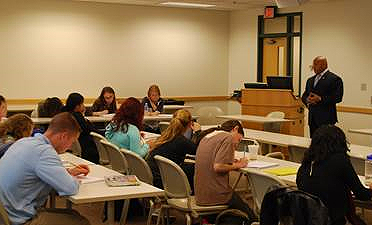Special Agent In Charge Gary Tuggle Speaks With Undergraduate Students At Lehigh University

PHILADELPHIA - Special Agent in (SAC) Gary Tuggle of the DEA Philadelphia Field Division was invited to speak with undergraduate students enrolled in a Comparative Politics course at Lehigh University in Bethlehem, Pennsylvania. These students have elected to spend their semester learning about the war on drugs and alternative approaches to dealing with the drug problem around the world. In preparation for SAC Tuggle’s visit, the students were assigned readings “Speaking Out against Drug Legalization” and “Drug Crop Eradication and Alternative Development in the Andes” by class Professor Nandini Deo.
The conversation was an open dialogue and focused on current drug policies, the criminal justice system, drug portrayal in the media, pharmaceutical companies and diversion, marijuana, and the current heroin and opiate epidemic. The students were interested in SAC Tuggle’s career with the DEA and prior background as a Baltimore City police officer and were excited to have the opportunity to ask questions about drug policies and government perspectives.
“Mr. Tuggle really drew our attention to the relationship between prescription opioids and street addiction in a way that we hadn’t spent much time thinking about,” said Professor Deo. “The students seemed really engaged and enthusiastic about his visit. We will be talking about it for a long time to come.”
SAC Tuggle’s visit to Lehigh University is one of several public forums and events he plans to attend in the region. “Getting out and into the community and engaging in an open dialogue with those who may have different beliefs, opinions and perspectives is extremely important,” said SAC Tuggle. “Working closely with schools, coalitions and community leaders is one of the ways in which I plan to lead the Philadelphia Field Division in tackling the primary enforcement priorities of the region; prescription opiates and heroin.”
On December 1, 2015, SAC Tuggle will return to Lehigh University to hear the student’s policy proposals to recommend reforms to drug policy based on their research.


